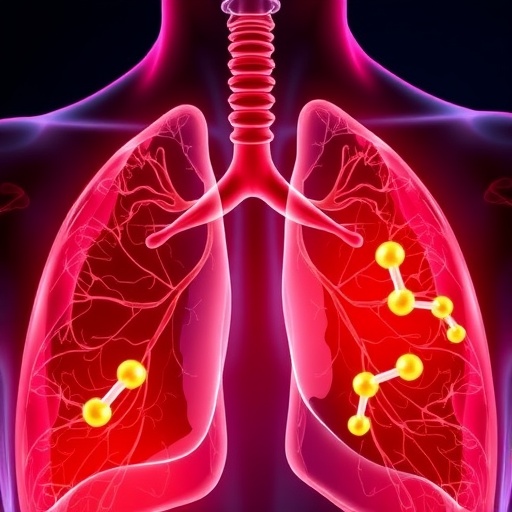Recent research highlights an intriguing intersection between diabetes medication and cancer treatment, specifically focusing on the efficacy of metformin-based combination therapies for patients suffering from non-small cell lung cancer (NSCLC). The study conducted by Thyagarajan, Gajjar, and Sahu dives deep into the experimental and clinical evidence surrounding this multifaceted approach, aiming to shed light on whether metformin, a popular antidiabetic drug, can play a pivotal role in enhancing cancer therapy outcomes for NSCLC patients.
As NSCLC continues to be one of the leading causes of cancer-related deaths worldwide, researchers are tirelessly searching for innovative treatment strategies that can improve patient prognosis and quality of life. Metformin, predominantly used to manage type 2 diabetes, has garnered attention over the years for its potential anti-cancer properties. Preliminary studies suggested that it might inhibit cancer cell proliferation, induce apoptosis, and enhance the efficacy of existing chemotherapeutic agents. This potential makes metformin an appealing candidate for combination therapies with traditional cancer treatments.
The underlying mechanisms through which metformin exerts its potential anticancer effects are often tied to its ability to activate adenosine monophosphate-activated protein kinase (AMPK). AMPK serves as a cellular energy sensor and plays a crucial role in regulating various metabolic processes. Upon activation by metformin, AMPK can hinder the growth of tumors by inhibiting the mTOR pathway, which is essential for cell growth and proliferation. This modulation opens avenues for using metformin alongside chemotherapy, as it may enhance the overall therapeutic maneuver against NSCLC cells.
In the realm of clinical studies, the authors of the research have meticulously compiled evidence from multiple patient cohorts and trials, showcasing the impact of metformin when integrated into conventional NSCLC treatment protocols. The results indicate a noteworthy trend: patients receiving metformin as an adjunct therapy tended to respond better to their primary cancer treatments, experiencing not only improved response rates but also better overall survival outcomes.
Furthermore, the benefits of metformin are not limited to improving treatment response; the medication is also associated with fewer side effects compared to traditional chemotherapy, enhancing the quality of life for cancer patients. As NSCLC treatments often involve rigorous regimens that can significantly impact a patient’s well-being, the integration of a well-tolerated drug like metformin could be revolutionary in the management of the disease.
However, while the findings are promising, the researchers underscore the need for larger and more robust clinical trials to validate these results definitively. They argue that more comprehensive data will help in establishing firm guidelines for the integration of metformin into the treatment landscape of NSCLC. It is critical to address concerns regarding optimal dosing regimens, treatment durations, and the drug’s potential interactions with other cancer therapies being utilized.
Additionally, the article tackles various patient demographics and varying responses to metformin treatment, acknowledging that biological differences among individuals may influence the outcomes of this combined therapeutic approach. Factors such as metabolic profiles, genetic predispositions, and existing comorbidities can dramatically alter how well a patient responds to metformin, necessitating personalized treatment plans tailored to each patient’s unique circumstances.
One of the most compelling aspects of this research is its potential to alter the future of cancer therapy significantly. The study not only evaluates metformin’s role in enhancing treatment efficacy but also emphasizes the importance of repurposing existing medications to combat the soaring costs and limited accessibility of new cancer drugs. With healthcare systems facing relentless pressure to provide effective treatments within financial constraints, leveraging affordable medications like metformin could be a game-changer in democratizing cancer care.
As this line of inquiry develops, it is essential for healthcare providers to stay informed about emerging evidence regarding metformin and its potential applications in oncology. As researchers continue to unravel the biological complexities of cancer, it becomes increasingly vital that practitioners are equipped with the knowledge necessary to consider all therapeutic options available for their patients. The landscape of cancer treatment is rapidly evolving, and the integration of innovative strategies will be crucial in the quest for improved patient outcomes.
In conclusion, the research presented by Thyagarajan et al. offers striking insights into the possible benefits of metformin as a foundational component of combination therapy for non-small cell lung cancer. With its intriguing biochemical mechanisms and favorable safety profile, metformin offers a novel and strategic approach to enhance therapeutic outcomes for patients battling this aggressive form of cancer. However, the path forward must be paved with rigorous scientific inquiry in the form of clinical trials that can substantiate these findings, ensuring that the potential of metformin is fully realized in the fight against NSCLC.
In a world increasingly aware of the necessity of holistic and patient-centered approaches in cancer care, the implications of this research are profound. Metformin may very well be more than just a diabetes medication; it could represent a crucial ally in the ongoing battle against one of the most formidable adversaries in the medical field.
Subject of Research: The efficacy of metformin-based combination therapies for non-small cell lung cancer.
Article Title: Are metformin-based combination approaches beneficial for non-small cell lung cancer: evidence from experimental and clinical studies.
Article References:
Thyagarajan, A., Gajjar, V. & Sahu, R.P. Are metformin-based combination approaches beneficial for non-small cell lung cancer: evidence from experimental and clinical studies.
Military Med Res 12, 61 (2025). https://doi.org/10.1186/s40779-025-00649-5
Image Credits: AI Generated
DOI: 10.1186/s40779-025-00649-5
Keywords: Metformin, Non-Small Cell Lung Cancer, Combination Therapy, Cancer Treatment, AMPK, Chemotherapy, Patient Outcomes.




